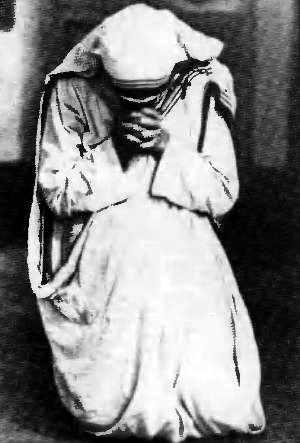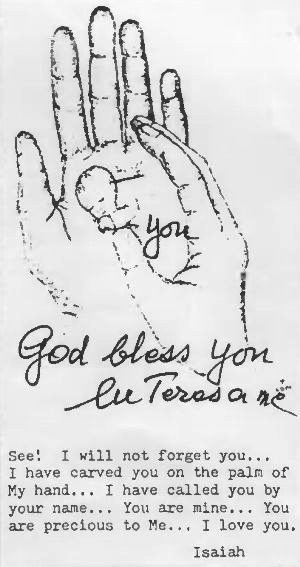![]()
The Words of the Isham Family
|
|
The Words of the Isham Family |

Mother
Teresa
I see Christ in every person I touch because He has said, "I was hungry, I was thirsty, I was naked, I was sick, I was suffering, I was homeless and you took me..." It is as simple as that. Every time I give a piece of bread, I give it to Him. That is why we must find a hungry one, and a naked one. That is why we totally are bound to the poor.
Those are the words of total devotion to Christ spoken by Mother Teresa, and the thoughts that have motivated and driven her, since the age of 17, to work with India's destitute and dying.
This past August 1984, when the Youth Seminar on World Religions was in Calcutta, India, for one evening before flying to Thailand, ten participants had the unforgettable experience of meeting with one of the world's great religious leaders and winner of a recent Nobel Peace Prize: Mother Teresa.
We had been trying to contact her residence, the Mother House, for the week we were in Madras, but to no avail. It seemed like a complete shot in the dark to risk trying to visit her. Actually, we never expected to meet her, having heard that she was in America at the time. Before setting off that evening from our airport hotel for the Mott Jheel slums of Calcutta where Mother Teresa works, we were warned and discouraged by everyone including our tour guides about our proposed venture -- hearing that it was the worst area of Calcutta and extremely dangerous. So we left behind all our money, jewelry, and cameras, and set out by taxi.
It was as if God had prepared the whole experience for us. Our taxis finally found the address of the Mother House, and, on knocking, we were led right upstairs by two nuns into a large room where the evening service of adoration to Christ was taking place. We knelt down behind the nuns and began to feel the attitude of devotion and peace suffusing the atmosphere. Then Mother Teresa herself went forward to lead the final prayers and the benediction. The service ended, and we were the last to leave.
Once out in the hallway, the two sisters who had led us into the service brought Mother Teresa to meet us. We must have looked like quite an oddity: ten people from different countries and different religious traditions. She asked us who we were and why we were there, and one of our tour group leaders, Shams Kairys (of the Sufi faith), responded with an explanation of our religious pilgrimage to different religious sites for the purpose of promoting world unity through understanding and dialogue. She nodded in approval and then began to tell us about her work.
Mother Teresa must have spoken to us for about 20 minutes, but what impressed us even more than her words was the incredible spiritual feeling of God's love that surrounds her and the Mother House. Her lack of affectation, her humility, love, and simplicity moved me tremendously. As is typical for her, she didn't want to talk about herself, but about her work and her people -- the poorest of the poor -- emphasizing that to do even the smallest act of kindness is like doing it for Christ.
She recounted a recent incident, in making her daily rounds of the slums, of finding an old man starving and covered with sores. She and another sister brought him to Nirmal Hriday meaning "Place of the Pure Heart", the home for dying destitutes founded by Mother Teresa and her Missionaries of Charity in 1952. There they washed and fed him. He told her that he was born on the streets and had lived all his life like an animal, but now he would die like an angel and go home to God. Then he died, feeling happy and loved, in their arms. The purpose, according to Mother Teresa, of Nirmal Hriday is
to help the poor die with God. We help them to say sorry to God. We just help them to make peace with God because that is the greatest need -- to die in peace with God.
Nobody, after going to Nirmal Hriday, has died depressed, despairing, unwanted, unfed, or unloved. That is why it is, according to Mother Teresa, the "treasure house of Calcutta."

Just before we left we prayed with her, and she gave each of us a card on which was drawn a baby lying in the palm of a hand and protectively covered by another hand. On the card was printed a message from the Book of Isaiah:
See! I will not forget you... I have carved you on the palm of My hand...I have called you by your name...You are mine...You are precious to Me...I love you.
Then she signed each card. We each kissed her hand, grateful to God for having met this beautiful courageous pioneer.
Afterwards, with her special permission, we were allowed to visit Shishu Bhavan, the house for abandoned children which is also the work center for the Missionaries of Charity. There were about 300 children up to age six there, living in very meager surroundings and wearing only rag diapers, but never have I seen such happy and secure children who seemed to radiate God's love -- with the effects of the power of God's love. The children seemed to have no fear at all of strangers. In fact, they were all smiling and holding out their arms to be picked up. We all "adopted" children from room to room, forming instant bonds, and leaving a little piece of our hearts in each room with them as we left.
No matter what details I could recount about the meeting with Mother Teresa, though, they seem inconsequential in comparison with the experience of actually meeting her in her surroundings and seeing the impressive amount of work she has accomplished. Even to walk between the Mother House and Shishu Bhavan and see and smell the poverty -- people actually living in makeshift tents on street corners and cooking their food on little fires by the light of streetlamps, men pulling carts carrying other human beings who run (not walk) through the city streets of Calcutta to be paid only a few cents for their labor -- even these sights are enough to shock and bring tears to the eyes of even the most hard-hearted person.
It's a travesty of what human life should be. It is unimaginable that we can live here in America in relative affluence while some people in third-world countries arc struggling for a hundred rupees a month (about ten dollars). Yet there is light even in that bleak existence, in the form of Mother Teresa and her Missionaries of Charity who, with sheer faith and hard work, arc saving parts of India -- offering many people better options such as fighting abortion with adoption, or at least offering people a happy passing to the next life.
The experience of sharing those moments with Mother Teresa and her Missionaries of Charity has left an indelible imprint on my mind and heart. It has also left me with a question: What can I do with my life that is as substantially worthwhile as what Mother Teresa is doing for so many of not only India's poor, but for the poor in many other countries? It is one thing to look out the fourth-floor window of my warm room and philosophize and talk, even with concern, about the world's problems. It is quite another to actualize one's philosophy as she has.